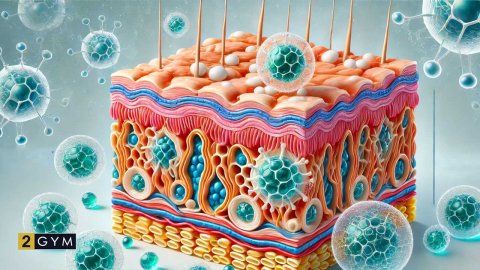Both collagen and elastin are extremely important for the skin – they provide its strength, allowing the skin to restore its shape after stretching or compression.
The less of them, the more flabby the skin will be. Collagen also has the ability to retain water: a decrease in its amount means that the skin will become dry, and wrinkles will begin to appear. There are factors that accelerate the process of skin aging.
Smoking, air pollution, exposure to ultraviolet rays (how can we not mention the passion for a bronze tan!) – all these lead to even less collagen and elastin in the body. With all the resulting consequences.
Skin Aging and Collagen Deficiency
It must be said right away: the process of skin aging cannot be reversed or even stopped – it can only be slowed down by trying to mitigate the obvious signs of aging. What is needed for this?
Absolutely right: it is necessary to ensure that collagen and elastin in our body do not decrease. That is, we need to figure out how to replenish their deficiency. Obviously, this can be done with the help of growth hormone: synthetic somatotropin stimulates collagen synthesis.
Logic suggests that a similar – albeit weaker – effect can be achieved with growth hormone secretagogues. This is practically all from pharmaceuticals.
What if we try to replenish the collagen deficiency simply by taking it as a supplement? After all, high-quality somatotropin is far from affordable for everyone, and the need to make injections several times a day creates certain inconveniences.
Collagen supplements are cheaper and more convenient, but how effective are they? This article will focus on collagen-containing supplements and what they can realistically offer, not just in the imagination of their creators.
Types of Collagen
Collagen is a common protein. Ideally, when it enters the gastrointestinal tract (GIT), it should break down into amino acids – like all other proteins.
Then what is the difference if you took collagen or, say, drank whey protein – both will enter the bloodstream as amino acids, just with different sets. This led many dermatologists to claim that taking collagen supplements is pointless.
The most vocal opponent of their use was Adam Friedman, a professor in the Department of Dermatology at George Washington University. There were even several studies confirming the respected specialist's point of view. But it turned out that things are not so simple.
The human body mainly contains five types of collagen – they are designated by Roman numerals from I to V. It was found that at least one of them – namely type II collagen – passes through the GIT without losing its chemical structure.
That is, when taking type II collagen, collagen molecules are guaranteed to enter the bloodstream. One could argue that type II collagen is characteristic of ligaments and joints, and the skin contains only types I and III collagen.
A little later, it was found that type III collagen is also minimally broken down – and its molecules enter the bloodstream mostly intact. But that's not all.
Research
What do studies on the beneficial properties of collagen for the skin say? At the bottom of the article in the drop-down menu Sources and References you will find the titles of all the studies mentioned further.
In 2012 and 2013, two studies were conducted, and their results were quite unexpected. It turned out that taking additional collagen – absolutely any type – stimulates the synthesis of this protein by the body itself! [1, 2]
Moreover: taking additional collagen also stimulates the synthesis of elastin – a protein that, as a reminder, is just as important for the skin as collagen. Thus, a solid foundation was laid for the use of collagen as a supplement, and further "construction of the main building" began.
Here are the results of a 2014 study: "Women who took between two and a half to five grams of collagen daily as a supplement for eight weeks had significantly healthier and firmer skin than those who did not take the supplements" [3].
Two more studies [4, 5], the results of which can be summarized as follows: "The hydration of the skin of women who took liquid collagen for 12 weeks improved, and the depth of wrinkles noticeably decreased – the skin was smoothed." The first study is dated 2014, the second – 2015.
There were many more studies, and their results were similar to those I mentioned. Summing them all up, it can be stated that by taking collagen-containing supplements, you are highly likely to increase skin hydration and firmness, as well as reduce the number and depth of wrinkles.
Collagen and Acne
There are assumptions that collagen supplements help prevent acne, but it is too early to say anything for sure. As is often said in such cases, additional research is needed.
Which Collagen to Choose
What to pay attention to when choosing? If you have read the study titles listed at the very end, you may have noticed that some of them mention "collagen peptides."
This is not a new development, but just another name for hydrolyzed collagen (collagen hydrolysate). In general, there are three forms in which collagen is produced today:
- hydrolyzed collagen (collagen peptides)
- undenatured collagen
- gelatin
If your priority is the health and well-being of your skin, you should only buy the first type. The origin of the collagen does not matter at all.
You should definitely pay attention to the manufacturer. Do not chase cheap prices: the rule "you get what you pay for" works very well here.
Form of Release
And about the form of release. In the overwhelming majority of studies, liquid collagen was used, so this form can be considered optimal. Collagen taken in liquid form is absorbed faster, and its bioavailability increases.
How Much Collagen to Take
As for the daily amount of collagen, two and a half grams are sufficient for skin health. Although this amount can be increased to five grams – this will provide some additional benefits. There is no point in increasing the daily dose of collagen any further.
How Long to Take Collagen
Collagen supplements are recommended to be taken in courses of 3 months, followed by a break of the same duration. From my point of view, this is pointless: why interrupt the intake of something that stimulates the synthesis of your own collagen?
Especially since there is a very recent study [6] proving that continuous intake of collagen supplements is completely harmless.
And here is what you should pay special attention to: collagen synthesis is impossible if there is a vitamin C deficiency in the body. Therefore, it is better either to buy a supplement that, in addition to collagen, also contains vitamin C, or simply take about 1 gram of vitamin C per day as a separate supplement.
Conclusion
Taking additional collagen can slow down the aging process of the skin, but it cannot reverse this process. This needs to be understood, and you should not expect any extraordinary miracles. And it is best to start taking collagen supplements as early as possible – this way, you will keep your skin healthy and firm for longer.
















Log in with ( Sign Up ? )
or post as a guest
Be the first to comment.